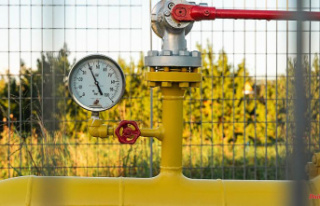The Turks are well received by their president's tough stance on NATO's northern expansion. The Swedish Prime Minister's inaugural visit to Ankara does not bring a breakthrough. Stockholm is now even planning a constitutional amendment to be able to extradite PKK members.
Turkey still does not pave the way for Sweden and Finland to join NATO. He hopes for more progress at the next Swedish-Finnish-Turkish meeting in Stockholm at the end of November, said Turkish President Recep Tayyip Erdogan after a first meeting with the new Swedish Prime Minister Ulf Kristersson in Ankara. Sweden wants to join NATO for its own security - it is only right if it does everything to help Turkey with its security.
Kristersson said his country will fully comply with a memorandum signed at the end of June, including on the fight against terrorism. "Sweden will honor all commitments it made to Turkey to counter the terrorist threat - both prior to its membership in NATO and as a future ally," he said at a press conference alongside Erdogan.
In response to the Russian war of aggression against Ukraine, Sweden and Finland applied for NATO membership in mid-May. So far, the two northernmost states of the EU have been close partners in the defense alliance, but not full members who could count on NATO assistance in the event of an attack. For the period of the accession process, however, the two countries have been given security guarantees by several parties. In general, the two countries have received plenty of tailwind from NATO. NATO Secretary General Jens Stoltenberg campaigned several times for northern enlargement, and 28 of the 30 members have already ratified the Swedish and Finnish proposals. Only Turkey and Hungary are still missing. In northern Europe, it is expected that Hungary will be ready for ratification in December and that this should not be subject to any conditions.
With Turkey, on the other hand, things remain difficult. She is concerned with arms exports and, above all, with alleged Swedish and Finnish support for the Syrian Kurdish militia YPG, which Turkey sees as an offshoot of the banned Kurdish Workers' Party PKK and thus as a "terrorist organization". The EU, which includes Sweden and Finland, also regards the PKK as a terrorist organization - but not the YPG and its political arm, the PYD.
Kristersson emphasized that Sweden regards the PKK as a terrorist organization. "Sweden understands that Turkey has been involved in a long and bloody fight against PKK terrorism," he said. "We know that Turkey is one of the NATO allies that has been hit hardest by terrorism." Such messages are not enough for Turkey. Although there are positive developments, there are still many steps to be taken, according to the Turkish parliament speaker Mustafa Sentop, according to the state news agency Anadolu, after his own meeting with Kristersson. For example, there was no progress on the extradition request.
At the end of June, the dispute seemed settled with an agreement between the three countries at the NATO summit in Madrid. However, Turkey continues to complain that agreements made at the time have not yet been fulfilled, especially by Sweden, including the extradition of more than 70 people. Observers also suspect other intentions behind the Turkish blockade, such as concessions from the USA with regard to fighter jet deliveries. According to surveys, Erdogan's approval among the population also increased after the announced NATO blockade - and elections are to be held in Turkey in June 2023.
Sweden had recently made a clear move towards Ankara, approved the export of war material to the NATO member for the first time since 2019 and distanced itself from the YPG and PYD. On Monday evening, the Swedish government also announced that it intends to support a voluntary NATO contribution fund to combat terrorism with ten million Swedish crowns (around 920,000 euros). The purpose of this was to strengthen NATO's role in the international fight against terrorism, the Ministry of Defense explained in Stockholm.
At the same time as Kristersson's visit to Ankara, the Swedish parliament in Stockholm announced that a constitutional amendment would enable anti-terror laws to be tightened. The amendment would make it possible "to limit the freedom of association of groups involved in terrorism," said the parliament in Stockholm. The vote should take place on November 16th. If the MPs vote in favor, the additional tightening of the anti-terror legislation that has been in force since July would come into force on January 1st, the parliamentary committee for constitutional questions announced. According to experts, this should make proceedings against PKK members easier.












